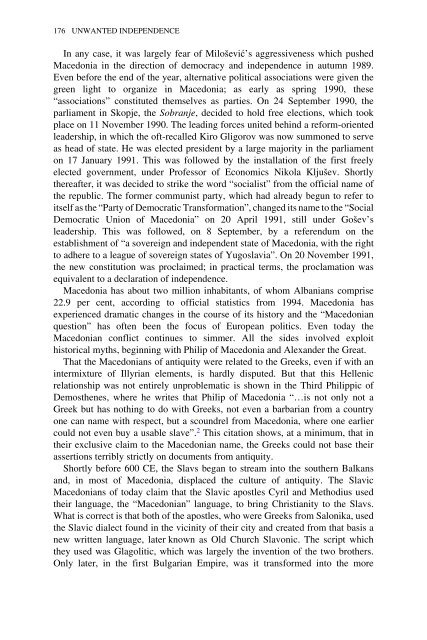Yugoslavia: A History of its Demise - Indymedia
Yugoslavia: A History of its Demise - Indymedia
Yugoslavia: A History of its Demise - Indymedia
You also want an ePaper? Increase the reach of your titles
YUMPU automatically turns print PDFs into web optimized ePapers that Google loves.
176 UNWANTED INDEPENDENCE<br />
In any case, it was largely fear <strong>of</strong> Milošević’s aggressiveness which pushed<br />
Macedonia in the direction <strong>of</strong> democracy and independence in autumn 1989.<br />
Even before the end <strong>of</strong> the year, alternative political associations were given the<br />
green light to organize in Macedonia; as early as spring 1990, these<br />
“associations” constituted themselves as parties. On 24 September 1990, the<br />
parliament in Skopje, the Sobranje, decided to hold free elections, which took<br />
place on 11 November 1990. The leading forces united behind a reform-oriented<br />
leadership, in which the <strong>of</strong>t-recalled Kiro Gligorov was now summoned to serve<br />
as head <strong>of</strong> state. He was elected president by a large majority in the parliament<br />
on 17 January 1991. This was followed by the installation <strong>of</strong> the first freely<br />
elected government, under Pr<strong>of</strong>essor <strong>of</strong> Economics Nikola Kljušev. Shortly<br />
thereafter, it was decided to strike the word “socialist” from the <strong>of</strong>ficial name <strong>of</strong><br />
the republic. The former communist party, which had already begun to refer to<br />
<strong>its</strong>elf as the “Party <strong>of</strong> Democratic Transformation”, changed <strong>its</strong> name to the “Social<br />
Democratic Union <strong>of</strong> Macedonia” on 20 April 1991, still under Gošev’s<br />
leadership. This was followed, on 8 September, by a referendum on the<br />
establishment <strong>of</strong> “a sovereign and independent state <strong>of</strong> Macedonia, with the right<br />
to adhere to a league <strong>of</strong> sovereign states <strong>of</strong> <strong>Yugoslavia</strong>”. On 20 November 1991,<br />
the new constitution was proclaimed; in practical terms, the proclamation was<br />
equivalent to a declaration <strong>of</strong> independence.<br />
Macedonia has about two million inhabitants, <strong>of</strong> whom Albanians comprise<br />
22.9 per cent, according to <strong>of</strong>ficial statistics from 1994. Macedonia has<br />
experienced dramatic changes in the course <strong>of</strong> <strong>its</strong> history and the “Macedonian<br />
question” has <strong>of</strong>ten been the focus <strong>of</strong> European politics. Even today the<br />
Macedonian conflict continues to simmer. All the sides involved exploit<br />
historical myths, beginning with Philip <strong>of</strong> Macedonia and Alexander the Great.<br />
That the Macedonians <strong>of</strong> antiquity were related to the Greeks, even if with an<br />
intermixture <strong>of</strong> Illyrian elements, is hardly disputed. But that this Hellenic<br />
relationship was not entirely unproblematic is shown in the Third Philippic <strong>of</strong><br />
Demosthenes, where he writes that Philip <strong>of</strong> Macedonia “…is not only not a<br />
Greek but has nothing to do with Greeks, not even a barbarian from a country<br />
one can name with respect, but a scoundrel from Macedonia, where one earlier<br />
could not even buy a usable slave”. 2 This citation shows, at a minimum, that in<br />
their exclusive claim to the Macedonian name, the Greeks could not base their<br />
assertions terribly strictly on documents from antiquity.<br />
Shortly before 600 CE, the Slavs began to stream into the southern Balkans<br />
and, in most <strong>of</strong> Macedonia, displaced the culture <strong>of</strong> antiquity. The Slavic<br />
Macedonians <strong>of</strong> today claim that the Slavic apostles Cyril and Methodius used<br />
their language, the “Macedonian” language, to bring Christianity to the Slavs.<br />
What is correct is that both <strong>of</strong> the apostles, who were Greeks from Salonika, used<br />
the Slavic dialect found in the vicinity <strong>of</strong> their city and created from that basis a<br />
new written language, later known as Old Church Slavonic. The script which<br />
they used was Glagolitic, which was largely the invention <strong>of</strong> the two brothers.<br />
Only later, in the first Bulgarian Empire, was it transformed into the more
















